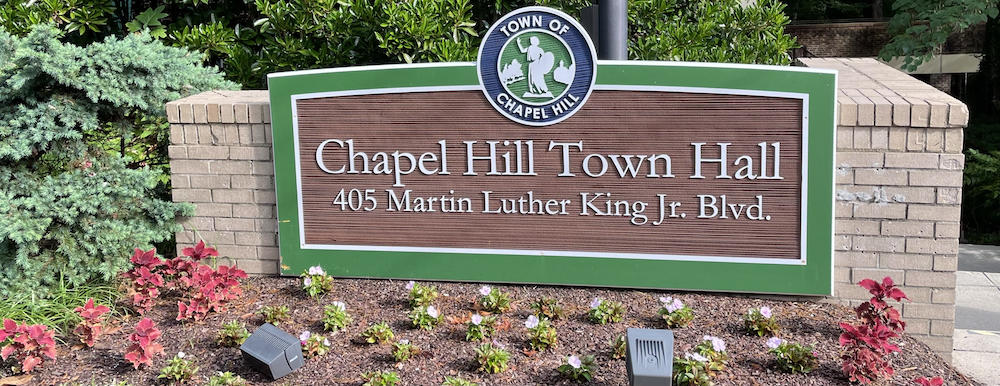Chapel Hill Town councilmember Adam Searing wrote a new edition of his newsletter this weekend, and as with other newsletters he’s written, this one gets some facts wrong.
Today, we’re going to address two errors.
The first has to do with the recent award of low-income housing tax credits to the Trinity Court affordable housing development project, one of two that the town submitted for possible tax-credit funding through the North Carolina Housing Finance Association (NCHFA). Trinity Court received about $10 million in tax credits, which means the project will move forward. That’s great news!
Somehow, in the context of praising the award, glorifying his own role in the project, and denigrating the other project that the town submitted, Adam Searing managed to get a ton of things wrong.
Fact: The federal government does not grant LIHTC awards.
Adam writes:
The federal government agreed with me that our Trinity Court affordable housing development was an excellent project and granted $10 million for construction help to get us moving.
TBB TL;DR – The federal government does not award these grants. The State of North Carolina’s HFA manages the Low-Income Housing Tax Credits (LIHTC) program. It’s true that the LIHTC tax credits are funded by the federal government, but there’s no one in DC who looked at these proposals and said “Yep, Adam is right about this one!”
Adam was not even on Council for much of the discussion around Trinity Court because it took part prior to his arrival. (He did vote for the project, as did everyone else on council.)
A short history:
1975: Trinity Court is built.
2018: Trinity Court is abandoned because the buildings had deteriorated.
May 2020: Council directs staff to begin planning for the comprehensive redevelopment of Trinity Court
June 2021: the Town signed an MOU with an experienced affordable housing development partner, Community Housing Partners (CHP)
August 2021: Community Housing Partners holds a public meeting about Trinity Court and does other communications about the project
November 2021: Community Housing Partners presents to Town Council
January 2022: Adam attends his first meeting as a Town councilmember
April 2022: Town Council makes their final vote on Trinity Court. Seven council members and the mayor vote for Trinity Court (8-0). Six council members and the mayor vote for Jay Street (7-1).
October 2022: Trinity Court is one of 28 projects in 23 North Carolina counties to receive a 2022 9% Low Income Housing Tax Credit (LIHTC) award from the State of North Carolina.
Fact: The Trinity Court and Jay Street proposals were both highly rated
Adam writes
The federal government also denied financial help for the controversial Jay Street affordable housing development on preserved open space parkland purchased by Chapel Hill voters for conservation – again agreeing with me that there are better places for housing in Chapel Hill.
Nope! Jay Street was not denied for the reasons Adam states. Both Trinity Court and Jay Street each received 60 points from the LIHTC program. In all relevant respects, NCHFA agreed with the mayor and seven council members that both were excellent projects.
You can get up to two more points for a high enough walk score, but neither project scored high enough to earn those extra points. How did they break the tie? The second tiebreaker is having a higher walk score, so that probably did it.
So why not fund both of Orange County’s projects? Because there’s a limited amount of LIHTC funding for the entire state, and NCHFA’s rules require that it fund projects across the state before funding multiple projects in a higher-income, smaller county like Orange County. If the Trinity Court project hadn’t been submitted, Jay Street likely would have been funded.
Fact (again): Town Council is not working to dismantle the American Legion Land. It’s working to build a park there.
Searing then devotes several fear-mongering paragraphs to the American Legion land.
As we’ve written before, the plan has ALWAYS been to build a park on the American Legion site.
What actually happened
Last June 1, the Chapel Hill Town Council discussed a petition, written by Council member Michael Parker and signed by four of his colleagues on the Council, to begin a planning process on the future of the American Legion property. (The American Legion property is not now, nor has it ever been, a town park. The petition submitted by the five town council members would help to generate the funding to make it one.)
(For more on the meeting, see Triangle Blog Blog’s recap, Chapelboro’s recap, and The Daily Tar Heel’s recap.)
The petition aligns with Council’s justification for purchasing the American Legion property in 2016. At that time, elected officials resolved to use some of the town-owned American Legion land for park space. Councilmember Parker even proposed an amendment clarifying that the council “did not intend for the entire property to be used as a park and that the town would explore other options through the master planning process.”
This motion passed 8-1, including votes in favor from Mayor Hemminger and Council Members Anderson and Parker. Former council members who supported non-park uses on the site included Nancy Oates who, although she voted against the resolution, suggested Fleet Feet as a potential private retailer on the site… because Council wanted to ensure businesses on the site would “fit in” (June 26, 2017 Town Council meeting).
FACT: We’d rather do other stuff than fact check!
Here at the Blog Blog we aspire to do more than just fact checks—but we don’t want misinformation to spread.
If you see something, let us know [email protected]
Previously in our fact-checking series
Factchecking Adam Searing’s newsletter ‘Controversial town topics’
Factchecking CHALT: How many voters live in the Berkshire?
Factchecking CHALT: How many vacant apartments are in Chapel Hill?

